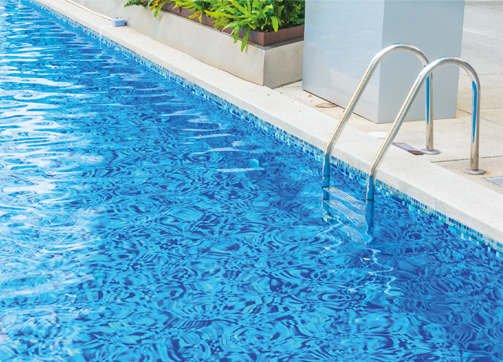Eco-Friendly Pool Maintenance Guide
These days, many homeowners want to add small, eco-friendly actions to their daily routine to help the environment in their own way. When it comes to filtration products and pool maintenance, there are several green practices and solutions you can put in place to minimize your footprint.
Don’t worry: none of these solutions will prevent you from fully enjoying your pool during the warm season!
Ecological Disposal of Filtration Products
Learn about Filtration Products
At Groupe Bellemare, we produce glass, sand and filtration salt of the highest quality available on the market. Consult each product sheet to learn more.
Here are some commonly used filtration products:
Glass: Used to replace sand in swimming pool filters, it offers better filtration and longer service life.
Sand: a traditional filtration system that removes debris and impurities from water
Salt: commonly used in saltwater pools to naturally generate chlorine
Chlorine: Chlorine is a widely used chemical disinfectant. Due to its very nature, it requires special care for environmentally friendly use and disposal.
Environmental Challenges and Impacts
Disposing of your filtration products the wrong way could lead to environmental impacts such as:
- Landfill Overload: Incorrect disposal of filtration products can cause pollution and contribute to overloading landfill sites.
- Chemical Contamination: Inappropriate disposal methods can introduce harmful chemicals into the environment.
Preparation
Before recycling or reusing your filtration products, make sure you prepare them properly. Failure to do so could make it impossible to recycle or reuse them.
Clean and rinse: Before disposing of your filtration products, make sure they are clean and free of any debris or residual chemicals. Thoroughly clean glass and sand, and rinse chlorine containers to remove all traces of the chemical. This step is crucial to prevent contamination during the disposal or recycling process.
Separate Materials: If you use several filtration products, sort them into separate containers to ensure proper disposal. This ensures that each material ends up in the right place. Separation also helps recycling centres to process materials more efficiently.
Environmentally Friendly Disposal Methods
The two main ways to dispose of your pool products responsibly are as follows:
- Recycling Programs: Look for local recycling centres or programs that accept filtration products for proper recycling. Some centres specialize in recycling pool-related chemical materials, and can handle items such as chlorine. We also have our own Groupe Bellemare recycling centre.
- Reuse: First, explore options for reusing filtration products. Glass, for example, can often be reused in construction projects as an environmentally friendly substitute for traditional abrasive materials. Similarly, sand can be reused for gardening or landscaping purposes.
- Donation: Donate reusable filtration products to community centres, schools or people in need. For example, organizations or people working on construction projects could benefit from glass grit. In addition, community gardens or landscaping projects can welcome sand donations for their various activities.
Eco-Friendly Pool Maintenance
Here’s a reminder of good pool maintenance practices. Remember these tips at the start of every summer!
Efficient Water Management
- Maintain water level as recommended to avoid wastage.
- Make regular inspections and check for leaks. If so, repair them quickly. Also, use a pool cover to minimize evaporation.
Energy-Saving Practices
- Install energy-efficient variable-speed pumps and set them to run at slower speeds during off-peak hours.
- Use timers and automation systems to optimize filtration cycles and minimize energy consumption.
- Install a timer on the pump to limit the hours of use. No need to filter your pool at night.
- Reduce backwashing to the filter pressure recommended by the manufacturer. Save chemicals, water and energy.
Chemical-Free Alternatives
- Use natural filtration systems to filter your pool water.
- Several minerals (such as sand and salt) act as alternatives to chlorine and disinfect your pool.
Responsible Pool Maintenance
These treatments are relatively quick and save you from using more filtration products than you should. Wastage is one of the main issues in pool maintenance.
- Clean the pool regularly by vacuuming and brushing the walls to minimize the need for filtration products.
- Test water regularly and maintain appropriate chlorine levels to reduce the need for overtreatment.
More Tips from Groupe Bellemare
We have many practical resources for pool owners. Here are some articles on detailed topics that may be of interest to you:
- Guide: How to Switch from Chlorine to Salt for your Pool
- Filtration Sand or Glass: Which one to Choose?
- When and Why Change Pool Filtration Sand?
Efficient water management, energy-saving practices and chemical-free alternatives will help you enjoy your pool with peace of mind and respect for the environment.
For further information, please contact your local dealer.
